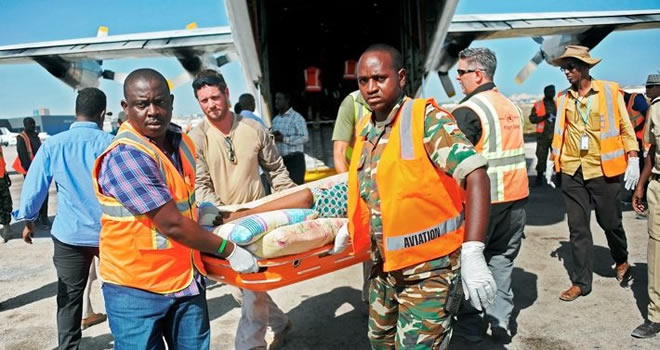
Tuesday, June 28, 2016
By Mark Anderson

PHOTO/ MOHAMED ABDIWAHAB/ AFP
Al-Shabaab remains undefeated as the country prepares for a national poll. The international forces fighting the Somali Islamist rebels of Al-Shabaab are struggling.
Shabaab forces recaptured several strategic towns in recent months. The group, which is known to exaggerate death tolls when claiming attacks, said it had killed 130 soldiers and seized tonnes of weapons in a siege on Kenya's El Adde military base in Gedo region on 15 January.
The group continues to carry out targeted assassinationsof lawmakers in Mogadishu, most recently on 9 March, when a car bomb exploded outside a tea shop popular with the city's police, killing three officers.
An Al-Shabaab operative detonated a bomb on a Daallo Airlines flight from Mogadishu to Djibouti on 2 February, prompting an emergency landing and underlining the group's ambitions to carry out attacks outside Somalia.
The US claimed its biggest single victory in its eight-year campaign against Al-Shabaab on 5 March, when one of its drones hit the group's Raso Camp training facility, killing about 150 fighters.
Washington trumpeted the attack as a tactical success that eliminated "an imminent threat": "The removal of those terrorist fighters degrades Al-Shabaab's ability to meet the group's objectives in Somalia, including recruiting new members, establishing bases and planning attacks on US and African Union Mission in Somalia (AMISOM) forces," Josh Earnest, the White House press secretary, told reporters.
Early last year, Al-Shabaab posted a video on social media encouraging attacks on shopping malls in the US, Canada and the UK. But rather than highlighting US success in gathering intelligenceand hitting the group where it hurts, analysts say the attack illustrates Al-Shabaab's growing strength.
"The group could assemble 150 people in one spot and was not afraid to do so," said J. Peter Pham, director of the Africa Center of the Atlantic Council, a Washington-based think tank. "These are not signs of a group that is supposedly on the run or defeated."
The African Union force, which commands about 22,000 troops, is facing fresh questions over its slow progress. It has been fighting Al-Shabaab for seven years. And while it has driven the terrorist group from Somalia's capital, it has yet to drive them from all its centres of power, despite promising to do so by the end of 2015.
"That suggests that there are some problems with the mission management," Matt Bryden, director of the Sahan Research think tank tells The Africa Report.
Friction between partners Kenya, Somalia and Ethiopia has led to tactical disagreements and ultimately stifled the mission.
Bickering over which contingent should take on Al-Shabaab in Jamaame and whether or not Ethiopian troops should have been deployed to Kismayo has hindered progress, explains Bryden, who is the former coordinator of the UN Monitoring Group for Somalia and Eritrea.
To make matters worse, the European Union, which pumped $1.2bn into AMISOM between 2007 and 2015, began to reduce its contribution to the mission's wages by 20% at the start of the year.
Heads of state attending a summit on AMISOM in Djibouti on 28 February still painted a rosy picture of the mission's future.
"Somalia is moving to a form of elections that has not happened in 47 years," said Somalia's President Hassan Sheikh Mohamud at the close of the summit. "This is a major indicator of the success of the AMISOM mission."
A free and fair contest could help improve Mogadishu's relationship with state governments and bring them into the fight against Al-Shabaab.
"Much of the frontline engagement with Al-Shabaab is happening at this state level rather than at the national level," says Bryden, noting that forces from Jubaland, Galmudug and Daraawiish are actively fighting the Islamist group.
But a deadlock remains over the electoral model, with Puntland in disagreement with the rest of the country, meaning that things could remain the same for a while.
"If we don't have a political transition in August", says Bryden, "then AMISOM and its partners and the funds that they are throwing at this problem are going to endure for a long time to come."